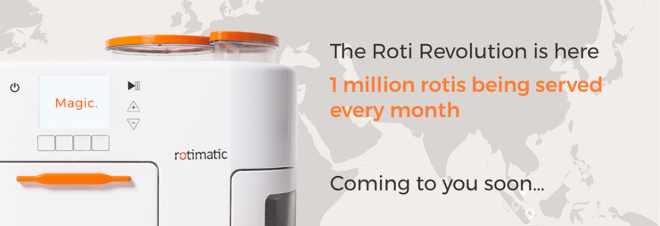
After eight years of arduously developing the flatbread-making kitchen robot Rotimatic, Singaporean couple Pranoti Nagarkar and Rishi Israni started rolling out the machine in stores.
Rotimatic is now available for purchase in Singapore through Mustafa Centre.
To recall, the Indian-born Singapore couple started Zimplistic, the company that brought forth Rotimatic, in 2008. Last year, those who pre-ordered the machine in 2014 received the first batch of Rotimatic machines.
In an interview with Fortune, Nagarkar said the machine makes it easier for bread lovers to prepare roti, a flatbread made from wholemeal flour.
"It is the world's first flatbread-making kitchen robot. It's smart, it has machine learning, it has artificial intelligence and on top of it, it's connected," she said.
The machine is WiFi-enabled and IoT-connected. A Straits Times Report noted that the machine received special mention by Prime Minister Lee Hsien Loong during last year's National Day Rally speech for its advanced technology.
How the machine works starts with the user filling the compartments with flour, oil, and water. The user can add spices to add flavour to the finished product.
A touchscreen, then, allows the user to select the number of roti required, as well as the thickness, the roast level, and the amount of oil. In around 30 minutes, the machine will be able to serve 20 cooked roti.
Nagarkar said the roti-maker can already make whole wheat tortillas.
"In the near future, it can make cornmeal tortillas. And then we are looking into how we can expand that into flavoured wraps," she noted.
The machine costs US$999 and is available currently in the United States and Singapore.
The inventor of the machine shared that it took 11 iterations before they achieved the machine as it is today.
"And it is quite a difficult product because it's not just mechanical engineering, but there's also a lot of electronics and software that has to be bonded with it," Nagarkar recalled.
She shared that she started the venture with only what it is in her pocket. Her husband helped her with raising the initial investment for the machine. They eventually raised US$15 million for through Series A and Series B.
Looking ahead, Nagarkar said they are gunning to hit US$50 million revenue this year by selling around 50,000 Rotimatics.
"We have a long wait list, so we are opening only to US and Singapore right now. We wanna go through the wait list and give them the priority to order machine," she shared.








